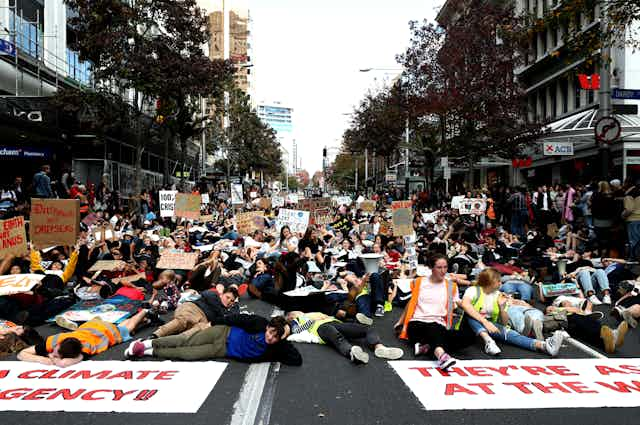The most recent protest by the Restore Passenger Rail climate protest group, in which a Wellington car dealership was defaced with red paint, is not just the latest in a local movement – it’s part of a global trend.
Airline bosses have been hit with cream pies, Just Stop Oil protesters have glued themselves to iconic pieces of art in famous galleries, school students are skipping school to march for climate justice, and airport runways have been invaded. Everywhere, including in New Zealand, roads and highways have been blocked.
It’s entirely likely such protests will continue and escalate in their impact as the climate emergency worsens, and frustration grows with a perceived lack of meaningful government action.
Groups such Extinction Rebellion view “non-violent direct action and civil disobedience” as not only justifiable but crucial in the face of what they see as an urgent existential threat.
But for every climate action there has been a political and legal reaction. From Europe to Australia there have been crackdowns. New laws have been drafted in Britain to create specific offences such as obstructing major transport works, interfering with key national infrastructure, and causing serious disruption by tunnelling.
Earlier this year, a New Zealander living in Britain was given a “draconian” three-year prison sentence for his role in a protest that shut down a busy road in London.
With the stakes rising, it’s important that governments and legal systems find ways to adapt, without risking a climate protest arms race that may only encourage increasingly unreasonable impacts on the general public.
Rights and freedoms
In New Zealand, a trend towards authorities reaching for harsher penalties is also evident.
The traditional sentence for obstructing a public road without consent is a fine of up to NZ$1,000. Such penalties are now being augmented with potential charges of criminal nuisance, and police have warned that protesters could face up to 14 years in jail for endangering transport.
That is longer than many serious crimes, including the maximum ten years under proposed law changes for ram-raiding.
Read more: Don’t look there: how politicians divert our attention from climate protesters' claims
At the same time, protest is a critical part of free and democratic societies, and has been used (often in novel ways) to achieve change we now take for granted.
Although there is no specific right to protest in law, protesting is a manifestation of the rights to freedom of movement, association and peaceful assembly in most liberal societies.
Globally, such rights are protected by the United Nations Universal Declaration of Human Rights, and the related framework of human rights treaties. In Aotearoa New Zealand, the Bill of Rights Act 1990 guarantees those rights.

No absolute right to protest
And yet, the right to protest is not absolute. As with most rights, it can be subject to such reasonable legal limits as can be justified in a free and democratic society.
In practice, this means not all forms of protest may be permissible, such as disorderly acts or ones that risk violence or public safety. Tolerance of protest and some levels of inconvenience should be expected in liberal democracies. But intentional and serious disruption to ordinary life may be illegal if it is done unreasonably.
Read more: Just Stop Oil: do radical protests turn the public away from a cause? Here's the evidence
Determining what is reasonable is the hard part. It involves assessing the scale and impact of the inconvenience, and the rights and freedoms of others affected.
So, peaceful protests that cause temporary inconvenience and limited obstruction might be permissible. But repeatedly blocking people from going about their business for prolonged periods may not be.
Climate protests exist at a moral and legal intersection. Reducing carbon emissions means targeting roads, highways and fossil fuel-powered vehicles by creating blockades and choke-points. But for centuries, authorities have been charged with keeping those vital routes open for citizens.
Worlds collide
The challenge is to find the balance between two world views that are colliding. It’s wrong to try to silence legitimate dissent, but how do governments and other authorities make room for, and even facilitate, a protest movement aimed at altering fundamental behaviours?
One response might be to designate new areas where such protests can be held (including on roads) as a way to help those messages be heard and seen. These must be authorised and conducted in ways that don’t unreasonably hinder the rights of other citizens.
But it is unlikely to be enough for more radical ends of the protest movement, which clearly view direct and increasingly disruptive actions as the only effective method.
There may be no simple answer. But New Zealand’s next government should review the current legal frameworks to ensure they are fit for purpose. People are equal before the law, and breaking the rules means being held to account. But the penalties must not be disproportionate.
Law and policy already acknowledge the climate crisis will demand enormous effort and change. They cannot also become blunt tools for repressing social movements dedicated to holding those same powers to account.

